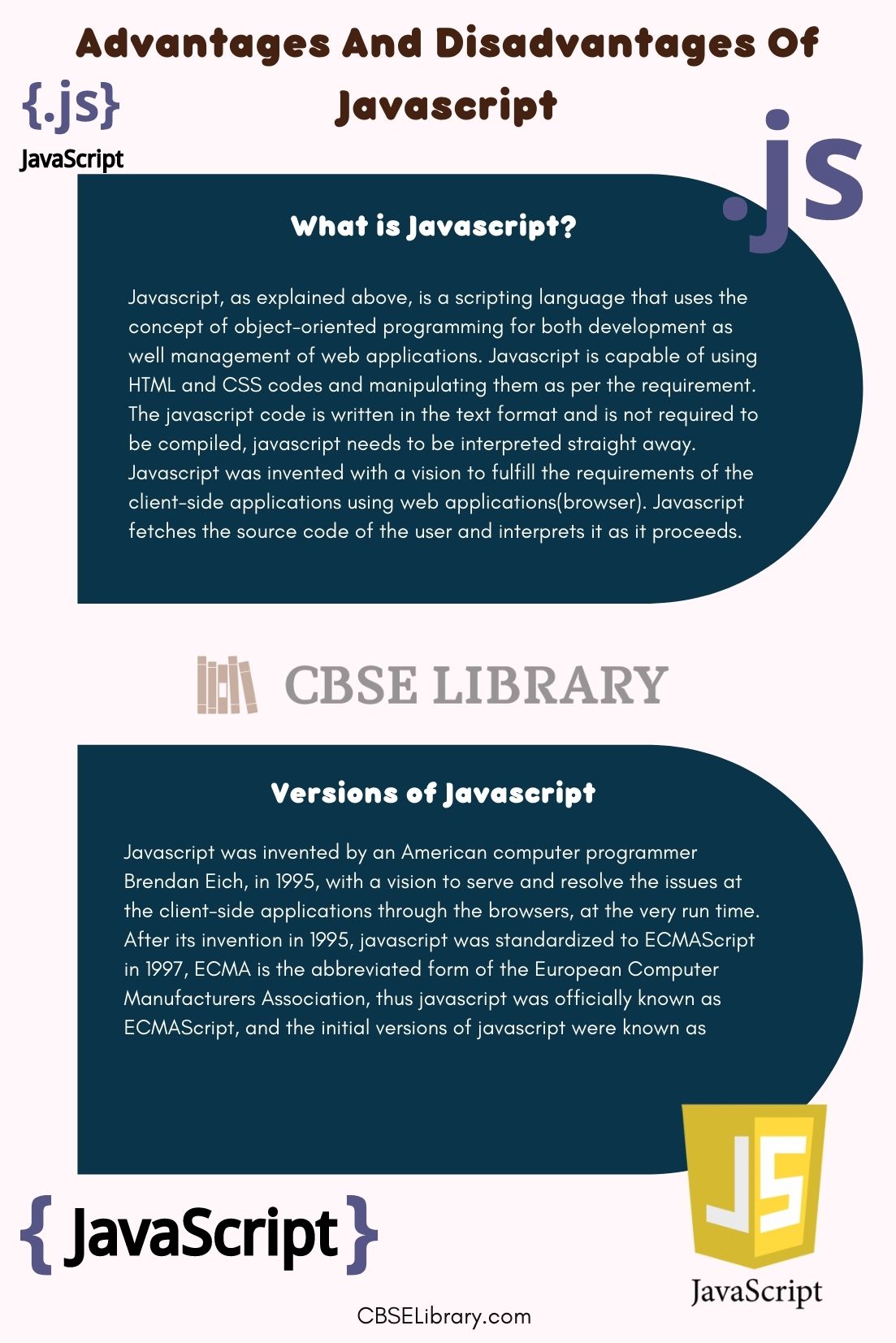Advantages And Disadvantages Of Javascript: Javascript, in a very layman’s language, could be explained as a scripting language that uses object-based programming script to design, develop and handle the web pages. In other words, javascript is an ‘oop’ based scripting language used for the development of web applications. Javascript was invented by a US-based computer programmer Brendan Eich in 1995, while it was standardized to ECMA-262 (ECMA= European Computer Manufacturers Association) in 1997, hence the javascript is also known as ECMAScript officially. Javascript can make changes to HTML codes as well as CSS(Cascading Style Sheets) codes. The article below contains detailed information about javascript.
Students can also find more Advantages and Disadvantages articles on events, persons, sports, technology, and many more.
What is Javascript? Advantages and Disadvantages of Javascript
Javascript, as explained above, is a scripting language that uses the concept of object-oriented programming for both development as well management of web applications. Javascript is capable of using HTML and CSS codes and manipulating them as per the requirement. The javascript code is written in the text format and is not required to be compiled, javascript needs to be interpreted straight away. Javascript was invented with a vision to fulfill the requirements of the client-side applications using web applications(browser). Javascript fetches the source code of the user and interprets it as it proceeds.
- Advantages of Javascript
- Disadvantages of Javascript
- Comparison Table for Advantages and Disadvantages of Javascript
- FAQ’s on Advantages And Disadvantages Of Javascript
Versions of Javascript
Javascript was invented by an American computer programmer Brendan Eich, in 1995, with a vision to serve and resolve the issues at the client-side applications through the browsers, at the very run time. After its invention in 1995, javascript was standardized to ECMAScript in 1997, ECMA is the abbreviated form of the European Computer Manufacturers Association, thus javascript was officially known as ECMAScript, and the initial versions of javascript were known as
- ES1- Also known as ECMAScript 1, it is the first version of javascript and was launched in 1997.
- ES2- The second version of javascript, also known as ECMAScript 2, was launched in 1998. It made some editorial changes in its version.
- ES3- ECMAScript 3 was its official name and it was the third version of javascript, it was launched in 1999. This version added certain features like regular expressions, try-catch feature, switch case, do-while loop, etc.
- ES4- The fourth version of javascript was not released.
- ES5- It was the fifth version of javascript, launched with some upgraded features like- strict mode, array iteration methods, comma trail for object literals, Jason support, etc. The version was launched in 2009 and its official name was ECMAScript 5.
- ES6- In 2015 the sixth edition of javascript was launched with some additional features like an array.find() method, and array.findindex() method along with default parameter values. The version was officially known as ECMAScript 6.
After the year 2015 which means the year 2016 onwards the versions of javascript were not named in the abbreviated form, instead, they were launched with their official names-
- ECMAScript 2016- This yearly version of javascript was released in 2016 along with some extra features such as exponential operators(**), array.includes() method etc.
- ECMAScript 2017- It was the next year’s edition of javascript that was launched in 2017. This version had several additional features and is considered as one of the versions with the most upgrades, the additional features were string padding, shared memory, and object. entries() method, object.values() method, asynchronized functions etc.
- ECMAScript 2018- It is the most recent and most updated version of javascript. It was launched in 2018 with the key changes of including several features, namely- asynchronous iteration, rest and spread properties, and Promise. finally(), etc.
Uses of Javascript
As we know javascript is used to write the development of web applications, hence javascript facilitates the user in several ways, some of its prime uses are mentioned below:-
- Javascript is most broadly used for the purpose of developing web-based applications. Javascript facilitates its users with interactive features for its web pages, the user can develop, manipulate, and manage the web pages effectively.
- Javascript is used for the process of validation on the web pages created.
- Javascript provides the facility of dynamicity and other special effects for the web pages created.
- Javascript is used to create web-based presentations by the user and this is possible because of the dynamic property of javascript.
- Javascript is broadly used for the creation of mobile applications.
- With the use of javascript mobile applications for all the operating systems can be developed, which means that all the operating systems support javascript.
- Javascript provides its users with the facility of dynamic drop-down list creation, creation of dialog boxes and pop-ups, creation of forms and receiving entries from the users, and many more different features.
Javascript Vs Java
- Javascript as we all know is a scripting language while Java is a programming language.
- Javascript uses the concept of object-based coding, which interprets the code, not like java which is an object-oriented programming concept and compiles the code. Compilation of java code refers to the process in which the entire code is being checked by java before execution while in the interpretation of javascript the source code written in javascript is read during run time and thus is interpreted.
- Javascript requires collaboration or integration with HTML language for its execution, while java does not require any other framework or language for its compilation and hence execution. This makes java a standalone language, while javascript does not possess this property of standalone due to its dependency on HTML.
- Javascript is used for the development of web pages and needs a browser for its execution, while on the other hand, Java has no such limitations, java requires JVM(Java Virtual Machine) for its compilation.
- Codes written in javascript are directly interpreted on the user side or client-side and no servers are required for compilation therefore less amount of memory is used, while the java codes are compiled on the servers before being executed on the user’s side due to which it consumes more memory space.
- In javascript, the data type of variable is not an issue, which means the user can store any data in a variable declared of any data type, which ensures that javascript is not a strongly typed language, whereas in java the scenario is different and the user has to store the data in the variable declared of the concerned data type, which makes java a strongly typed language.
- Code in javascript is written in a complete text form and is contained on the system as the ‘source code’ using the ‘.js’ extension for storing a file, while the code written in java is contained on the system as the ‘byte code’ and it uses ‘.java’ extension for the storage of its file.

Advantages of Javascript
Javascript has gained a huge amount of popularity throughout the world as a web-based development tool and this is because javascript provides numerous advantages for the users. Some of the advantages are as follows:-
- Easier Code: The complexity of codes for any application has always been the biggest challenge for developers worldwide. Javascript has resolved this problem to a huge extent by providing the facility of interpreting code directly on the user’s machine. This has reduced the complexity of code and made it easier for the developer as well as for the user.
- Fast Processing: One of the most promising advantages of javascript is its speed of processing. The javascript executes with lightning speed because it is being interpreted directly on the host’s machine and does not require any server for its compilation as java does. Therefore the compilation time of javascript is reduced and its processing speed gets boosted.
- Global Acceptance: Javascript, because of its countless facilities such as fast processing, accuracy, independence from the server, easier code, user friendly and uniformity, etc, has become the most widely accepted scripting language throughout the world. It is preferred by most developers worldwide over other scripting languages like PHP.
- Browser Friendly: Javascript is broadly accepted by all the modern browsers over all the modern operating systems and provides the desired output. Javascript has emerged as the most browser-friendly scripting language over the years.
- Low Storage and Low Server Holding: As javascript does not need any server for its compilation and is interpreted directly over the client end, it has no dependency on the server, and therefore it does not need too much storage capacity.
Disadvantages of Javascript
Though javascript is the most popular and very advantageous web development language yet it comes with certain flaws and disadvantages, such as
- Security Threat: As javascript interprets directly on the client-side it always has a possibility of transmitting any harmful trojan or bug over the host’s machine, making javascript a security threat for the system.
- No Testing: The javascript code is executed directly over the host’s machine which disables the debugging or testing of source code. It sometimes results in execution errors on the client-side.
- Browser Compatibility: Although javascript is supported by almost all the modern browsers over most of the operating systems, some of the outdated and old browsers still do not support javascript code.
- Safety of Code: Javascript never hides the source code and gives the public access to it, which means the source code of javascript is always visible to all and compromises the safety of the source code.
Comparison Table for Advantages and Disadvantages of Javascript
| Advantages of Javascript | Disadvantages of Javascript |
| Easier Code | Security Threat |
| Fast Processing | No Testing |
| Global Acceptance | Browser Compatibility |
| Browser Friendly | Safety of Code |
| Low Storage and Low Server Holding |

FAQ’s on Advantages And Disadvantages Of Javascript
Question 1.
Who and when invented Javascript?
Answer:
Javascript was invented by an American computer programmer Brendan Eich in the year 1995.
Question 2.
What was the use to invent Javascript?
Answer:
Javascript was invented in order to facilitate the client end execution of code, which could be supported by other browsers also.
Question 3.
How is Javascript different from Java?
Answer:
Javascript is a scripting language that interprets directly on the client-side while java is a programming language that needs compilation of code before its execution.
Question 4.
Why is Javascript the most popular scripting language among developers?
Answer:
Javascript is the most popular scripting language among developers because of its numerous facilities such as browser compatibility, easier code, fast processing, low storage, etc.
